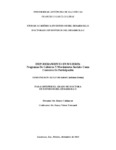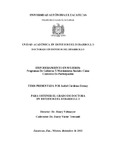
Please use this identifier to cite or link to this item:
http://ricaxcan.uaz.edu.mx/jspui/handle/20.500.11845/75Full metadata record
| DC Field | Value | Language |
|---|---|---|
| dc.contributor | 331783 | - |
| dc.contributor.advisor | Veltmeyer, Henry | - |
| dc.contributor.advisor | Tetreault, Darcy | - |
| dc.creator | Cárdenas Demay, Isabel | - |
| dc.date.accessioned | 2017-04-18T15:25:13Z | - |
| dc.date.available | 2017-04-18T15:25:13Z | - |
| dc.date.issued | 2012-12 | - |
| dc.identifier.uri | http://hdl.handle.net/20.500.11845/75 | - |
| dc.description | This research addresses women’s empowerment and their agency for social change within the field of development studies. It is a topic that has been relevant at the national and international levels, in governmental, academic and civil society settings. The goal is to analyze two prototypes of women’s empowerment: empowerment from above, resulting from the participation of poor women in anti-poverty governmental programs (such as Oportunidades and Hábitat in Mexico) and empowerment from below, resulting from participation in social movements. The comparative analysis intends to show the contrasts between those two empowering processes and their capacity to modify women’s objective and subjective social condition, along with changes in their family and community’s social condition. In order to examine the different aspects of empowerment, three theoretical and practical approaches are considered from a gender perspective: a) the Marxist-feminist structural thought according to which women’s empowerment is contingent on the elimination of structural inequalities, b) the social-liberal approach, which is the dominant paradigm of contemporary capitalism that promotes the elimination of institutional barriers to gender equality by increasing developmental opportunities for women, and c) the feminist-postmodern school of thought, which emphasizes the need to raise women’s consciousness in order to acquire power within and become active agents of change. Preliminary field research was carried out in order to identify six women with experiences that correspond to a high degree to one of the two prototypes: three who have participated in governmental programs designed to empower women and break the intergenerational transmission of poverty, and three who have participated in social movements. The three social activists that were selected and volunteered to participate in this study have been involved in resistance movements to the construction of large dams in the state of Jalisco. In-depth interviews were applied to all six women in order to carry out a “course of life analysis”. The findings indicate that empowerment from above temporarily enhances the material condition of women and their families (in terms of economy, health and education) and it contributes to the reshaping of gender relations within the household, without raising a self-conscious awareness. In contrast, the case studies of empowerment from below suggest that participation in social movements helps women to develop the ability to raise their voices, speak out against social injustice and become social subjects willing to increase their collective power over the institutions that oppress them in terms of class and gender. At the same time, the field research suggests that heavy involvement in social movements can lead to physical and emotional stress | es_ES |
| dc.description.abstract | La presente investigación se inserta en el campo de los estudios del desarrollo y pretende abordar un tema que ha sido de gran interés en contextos gubernamentales, académicos y de la sociedad civil, tanto a nivel local, como nacional e internacional: el empoderamiento de las mujeres y su agencia para el cambio social. El objetivo del estudio es analizar dos tipos prototípicos de empoderamiento femenino: el empoderamiento desde arriba que se gesta a través de la participación protagónica de mujeres pobres en el contexto de los programas de gobierno para el combate a la pobreza (Oportunidades y Hábitat) y el empoderamiento desde abajo de actoras clave en el contexto de los movimientos sociales (conflictos socioambientales). El análisis comparativo pretende establecer los contrastes en torno a los procesos de empoderamiento y sus alcances para generar cambios en la condición social, material e inmaterial, de las mujeres, sus familias y sus comunidades. El enfoque aquí propuesto recoge la perspectiva de género e incorpora tres perspectivas teórico-prácticas que abordan distintos elementos importantes del empoderamiento femenino: la línea de pensamiento estructural feminista-marxista, según la cual el empoderamiento femenino requiere de la eliminación de las desigualdades estructurales, la visión liberal-social para la equidad de género que promueve la eliminación de barreras institucionales que impiden a las mujeres aprovechar sus oportunidades de desarrollo y que forma parte del paradigma dominante del capitalismo contemporáneo y, por último, la postura feminista-posmoderna que enfatiza la necesidad de promover en las mujeres la toma de conciencia sobre su poder potencial para su transformación en sujetos sociales. A partir del análisis de curso de vida y entrevistas a profundidad de las mujeres participantes, se concluye que el empoderamiento desde arriba mejora temporalmente la condición material (económica, salud y educación) de las mujeres y sus familias, se renegocian algunas relaciones de género pero no se da una toma de conciencia sobre sí. En el contexto de los movimientos sociales, se observa un deterioro del bienestar físico y emocional, pero las mujeres logran alzar la voz para convertirse en sujetos sociales que buscan un aumento de su poder colectivo sobre las instituciones que las oprimen, como clase y como género. | es_ES |
| dc.language.iso | spa | es_ES |
| dc.publisher | Universidad Autónoma de Zacatecas | es_ES |
| dc.relation.isbasedon | Doctor en Estudios del Desarrollo | es_ES |
| dc.relation.uri | generalPublic | es_ES |
| dc.rights | Attribution-NonCommercial-ShareAlike 3.0 United States | es_ES |
| dc.rights.uri | http://creativecommons.org/licenses/by-nc-sa/3.0/us/ | * |
| dc.subject.classification | CIENCIAS SOCIALES [5] | es_ES |
| dc.subject.other | info:eu-repo/classification/Empooderamiento Femenino | - |
| dc.subject.other | info:eu-repo/classification/Condición social | - |
| dc.subject.other | info:eu-repo/classification/Movimientos sociales | - |
| dc.subject.other | info:eu-repo/classification/Programa de combate a la pobreza | - |
| dc.subject.other | info:eu-repo/classification/Oportunidades/Hábitat | - |
| dc.subject.other | info:eu-repo/classification/Women Empowerment | - |
| dc.subject.other | info:eu-repo/classification/Social condition | - |
| dc.subject.other | info:eu-repo/classification/Social Movements | - |
| dc.subject.other | info:eu-repo/classification/Anti-Poverty Programs | - |
| dc.subject.other | info:eu-repo/classification/Gender and Development | - |
| dc.title | Empoderamiento en Mujeres: Programa de gobierno y movimientos sociales como contexto de participación | es_ES |
| dc.type | info:eu-repo/semantics/doctoralThesis | es_ES |
| Appears in Collections: | *Tesis*-- UA Estudios del Desarrollo | |
Files in This Item:
| File | Description | Size | Format | |
|---|---|---|---|---|
| tesisIsabelCompleta.pdf | Tésis | 4,62 MB | Adobe PDF |  View/Open |
| portada.pdf | Portada | 1,79 MB | Adobe PDF |  View/Open |
This item is licensed under a Creative Commons License
